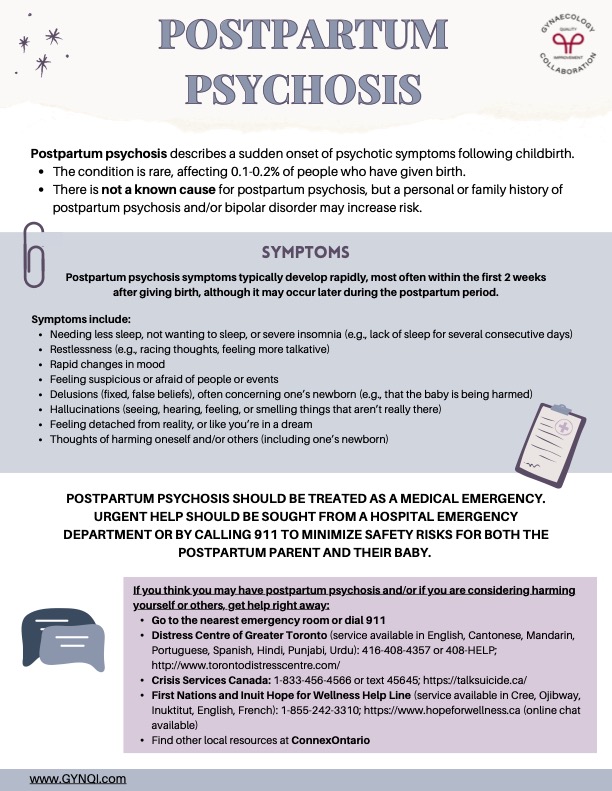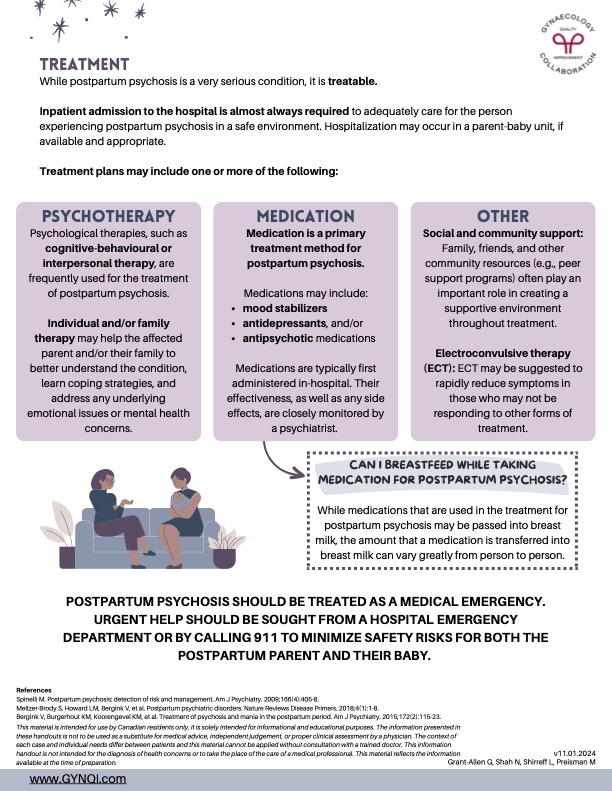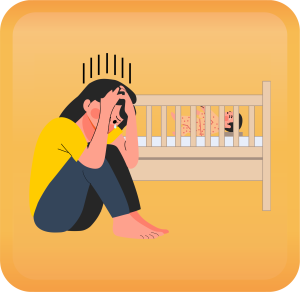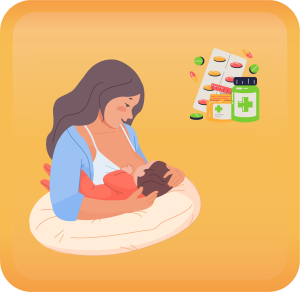
Postpartum Psychosis
Postpartum psychosis describes a sudden onset of psychotic symptoms following childbirth.
- The condition is rare, affecting 0.1-0.2% of people who have given birth.
- There is not a known cause for postpartum psychosis, but a personal or family history of postpartum psychosis and/or bipolar disorder may increase risk.
Symptoms
Postpartum psychosis symptoms typically develop rapidly, most often within the first 2 weeks after giving birth, although it may occur later during the postpartum period.
Symptoms include:
- Needing less sleep, not wanting to sleep, or severe insomnia (e.g., lack of sleep for several consecutive days)
- Restlessness (e.g., racing thoughts, feeling more talkative)
- Rapid changes in mood
- Feeling suspicious or afraid of people or events
- Delusions (fixed, false beliefs), often concerning one’s newborn (e.g., that the baby is being harmed)
- Hallucinations (seeing, hearing, feeling, or smelling things that aren’t really there)
- Feeling detached from reality, or like you’re in a dream
- Thoughts of harming oneself and/or others (including one’s newborn)
Postpartum Psychosis should be treated as a medical emergency. Urgent help should be sought from a hospital emergency department or by calling 911 to minimize safety risks for both the postpartum parent and their baby.
If you think you may have postpartum psychosis and/or if you are considering harming yourself or others, get help right away:
- Go to the nearest emergency room or dial 911
- Distress Centre of Greater Toronto (service available in English, Cantonese, Mandarin, Portuguese, Spanish, Hindi, Punjabi, Urdu): 416-408-4357 or 408-HELP; http://www.torontodistresscentre.com/
- Crisis Services Canada: 1-833-456-4566 or text 45645; https://talksuicide.ca/
- First Nations and Inuit Hope for Wellness Help Line (service available in Cree, Ojibway, Inuktitut, English, French): 1-855-242-3310; https://www.hopeforwellness.ca (online chat available)
- Find other local resources at ConnexOntario
Treatment
While postpartum psychosis is a very serious condition, it is treatable.
Inpatient admission to the hospital is almost always required to adequately care for the person experiencing postpartum psychosis in a safe environment. Hospitalization may occur in a parent-baby unit, if available and appropriate.
Treatment plans may include one or more of the following:
Psychotherapy
Psychological therapies, such as cognitive-behavioural or interpersonal therapy, are frequently used for the treatment of postpartum psychosis.
Individual and/or family therapy may help the affected parent and/or their family to better understand the condition, learn coping strategies, and address any underlying emotional issues or mental health concerns.
Medication
Medication is a primary treatment method for postpartum psychosis.
Medications may include:
- mood stabilizers
- antidepressants, and/or
- antipsychotic medications
Medications are typically first administered in-hospital. Their effectiveness, as well as any side effects, are closely monitored by a psychiatrist.
Other
Social and community support: Family, friends, and other community resources (e.g., peer support programs) often play an important role in creating a supportive environment throughout treatment.
Electroconvulsive therapy (ECT): ECT may be suggested to rapidly reduce symptoms in those who may not be responding to other forms of treatment.
Can I Breastfeed While Taking Medication For Postpartum Psychosis?
While medications that are used in the treatment for postpartum psychosis may be passed into breast milk, the amount that a medication is transferred into breast milk can vary greatly from person to person.
Postpartum Psychosis should be treated as a medical emergency. Urgent help should be sought from a hospital emergency department or by calling 911 to minimize safety risks for both the postpartum parent and their baby.




